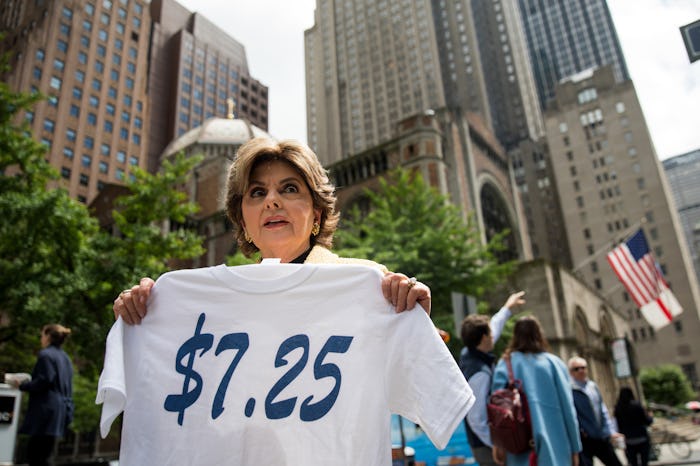News

Increasing Minimum Wage Has Lifted 10,000 Kids From Poverty, Maine Study Finds
Debates around minimum wage continue to dominate politics, as local movements branch into powerful national pushes for better wages and working conditions. It's an important discussion for adults to have, but where do kids weigh in? A new Maine study recently found that increasing minimum wage has lifted 10,000 kids from poverty.
Minimum wage is complicated to discuss, because it has both state and federal standards. As of 2018, the federal minimum wage is $7.25 per hour, which the Department of Labor noted as going into effect on July 24, 2009. When it comes to states, though, minimum wage can vary greatly.
In July of 2017, Forbes reported that only 29 states (and the District of Columbia) have set a minimum wage higher than the federal standard. This is alarming, because the federal standard honestly isn't that much. Stories of people attempting to survive on minimum wage have made the news before, but there is a new push as labor organizers across the country fight for a $15 minimum wage standard.
Amidst endless debates, it's easy to lose track of the vulnerable voices in the conversation. Many fighting for increased minimum wage speak about their struggles with poverty as adults, but what about the children?
In the United States, 15 million children live in families with incomes below the federal poverty threshold, as reported by the National Center for Children in Poverty. Overall, that comes out to 21 percent of all children.
The poverty threshold differs based on family size and it's not very forgiving. According to a 2017 map on average household size, the 2017 average family in the United States consisted of 2.6 people per household. A family of three needs to make $20,780 per year, or less, to meet the federal poverty guidelines.
In 2017, Maine was one of many states to increase their minimum wage. According to Maine Public, the state raised their minimum wage from $7.50 to $9. And now, the data tracing the raises impact has returned, thanks to a study by the Maine Center for Economic Policy (MECEP).
The study used a survey to discover the effects of raising the minimum wage, according to Maine Public. What they found was astonishing! The MECEP reported that:
The change led to the fastest wage increase in a decade for low-income Mainers and helped lift 10,000 Maine children out of poverty — a greater number than were brought above the poverty threshold in any other year in the last decade.
In addition, MECEP reported that low-income households experienced the largest increase in household income since 2001. And the decline Maine saw in child poverty from 2016 to 2017 was larger than the reduction in national or regional poverty levels over the same period of time.
Center analyst James Myall spoke about the data, reportedly saying, according to Maine Public:
“It’s always very difficult to sort of isolate just one factor in particular and say it’s just totally because of the minimum wage increase, but there are a number of things that sort of point to that. Yeah, some of the secondary things could include that the economy did continue to grow in Maine. When we dug into the sort of underlying data, what we can see is that the increase in the minimum wage in Maine showed a big increase for wages and income for households toward the bottom end of the income spectrum, so primarily those folks living in poverty or near poverty.”
There's no doubt that increasing minimum wage is going to have an impact on child poverty levels. There are other factors involved, and other things that need to be fixed, but this is a sign of states making the right start.
Currently, cities like Los Angeles, Seattle, Pittsburgh, and New York, among others, have enacted a $15 minimum wage policy, as reported by The Daily Dot. Although no state has enacted a $15 minimum wage, and it hasn't reached the federal level, Maine's study helps show the incredible benefits increasing minimum wage will have.